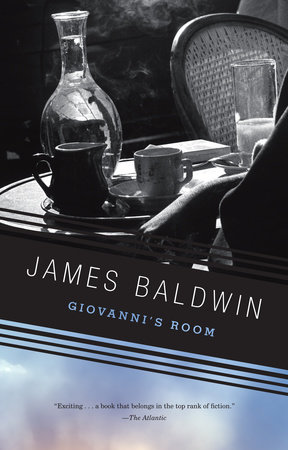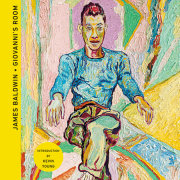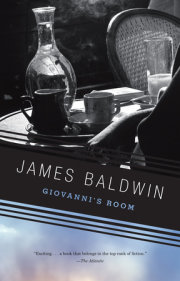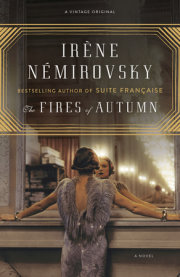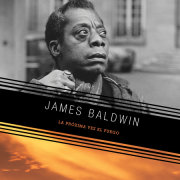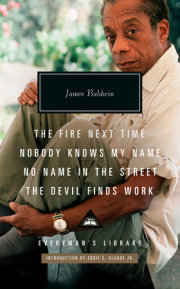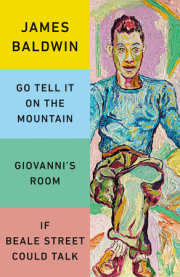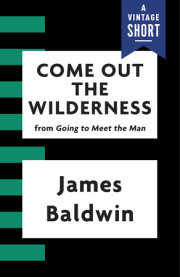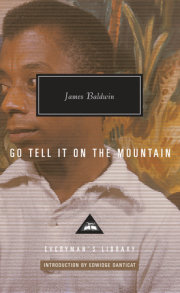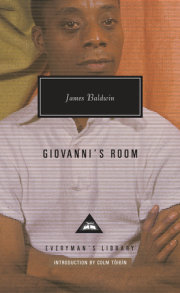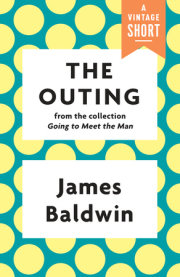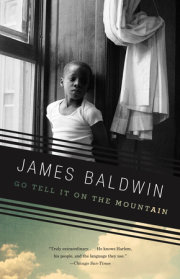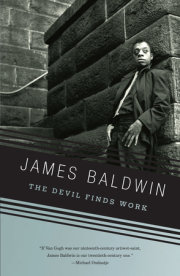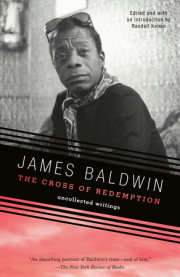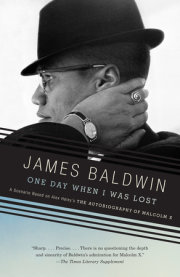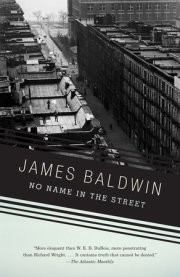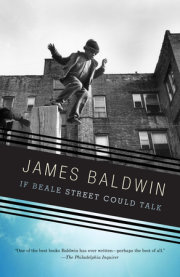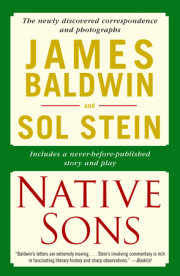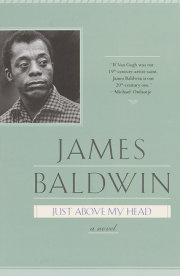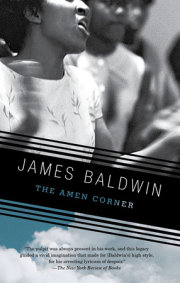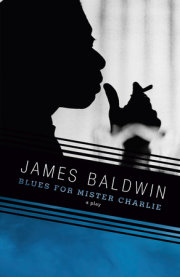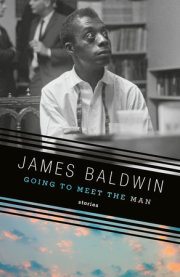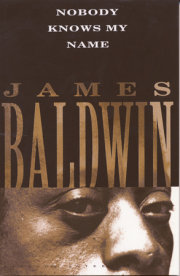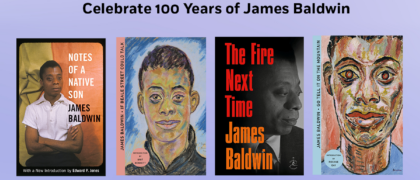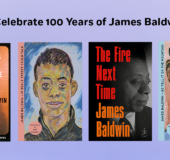I stand at the window of this great house in the south of France as night falls, the night which is leading me to the most terrible morning of my life. I have a drink in my hand, there is a bottle at my elbow. I watch my reflection in the darkening gleam of the window pane. My reflection is tall, perhaps rather like an arrow, my blond hair gleams. My face is like a face you have seen many times. My ancestors conquered a continent, pushing across death-laden plains, until they came to an ocean which faced away from Europe into a darker past.
I may be drunk by morning but that will not do any good. I shall take the train to Paris anyway. The train will be the same, the people, struggling for comfort and, even, dignity on the straight-backed, wooden, third-class seats will be the same, and I will be the same. We will ride through the same changing countryside northward, leaving behind the olive trees and the sea and all of the glory of the stormy southern sky, into the mist and rain of Paris. Someone will offer to share a sandwich with me, someone will offer me a sip of wine, someone will ask me for a match. People will be roaming the corridors outside, looking out of windows, looking in at us. At each stop, recruits in their baggy brown uniforms and colored hats will open the compartment door to ask Complet? We will all nod Yes, like conspirators, smiling faintly at each other as they continue through the train. Two or three of them will end up before our compartment door, shouting at each other in their heavy, ribald voices, smoking their dreadful army cigarettes. There will be a girl sitting opposite me who will wonder why I have not been flirting with her, who will be set on edge by the presence of the recruits. It will all be the same, only I will be stiller.
And the countryside is still tonight, this countryside reflected through my image in the pane. This house is just outside a small summer resort — which is still empty, the season has not yet begun. It is on a small hill, one can look down on the lights of the town and hear the thud of the sea. My girl, Hella, and I rented it in Paris, from photographs, some months ago. Now she has been gone a week. She is on the high seas now, on her way back to America.
I can see her, very elegant, tense, and glittering, surrounded by the light which fills the salon of the ocean liner, drinking rather too fast, and laughing, and watch- ing the men. That was how I met her, in a bar in Saint- Germain-des-Pres, she was drinking and watching, and that was why I liked her, I thought she would be fun to have fun with. That was how it began, that was all it meant to me; I am not sure now, in spite of everything, that it ever really meant more than that to me. And I don’t think it ever really meant more than that to her — at least not until she made that trip to Spain and, finding herself there, alone, began to wonder, perhaps, if a lifetime of drinking and watching the men was exactly what she wanted. But it was too late by that time. I was already with Giovanni. I had asked her to marry me before she went away to Spain; and she laughed and I laughed but that, somehow, all the same, made it more serious for me, and I persisted; and then she said she would have to go away and think about it. And the very last night she was here, the very last time I saw her, as she was packing her bag, I told her that I had loved her once and I made myself believe it. But I wonder if I had. I was thinking, no doubt, of our nights in bed, of the peculiar innocence and confidence, which will never come again, which had made those nights so delightful, so unrelated to past, present, or anything to come, so unrelated, finally, to my life since it was not necessary for me to take any but the most mechanical responsibility for them. And these nights were being acted out under a foreign sky, with no one to watch, no penalties attached — it was this last fact which was our undoing, for nothing is more unbearable, once one has it, than freedom. I suppose this was why I asked her to marry me: to give myself something to be moored to. Perhaps this was why, in Spain, she decided that she wanted to marry me. But people can’t, unhappily, invent their mooring posts, their lovers and their friends, anymore than they can invent their parents. Life gives these and also takes them away and the great difficulty is to say Yes to life.
I was thinking, when I told Hella that I had loved her, of those days before anything awful, irrevocable, had happened to me, when an affair was nothing more than an affair. Now, from this night, this coming morning, no matter how many beds I find myself in between now and my final bed, I shall never be able to have any more of those boyish, zestful affairs — which are, really, when one thinks of it, a kind of higher, or, anyway, more pretentious masturbation. People are too various to be treated so lightly. I am too various to be trusted. If this were not so I would not be alone in this house tonight. Hella would not be on the high seas. And Giovanni would not be about to perish, sometime between this night and this morning, on the guillotine.
I repent now — for all the good it does — one particular lie among the many lies I’ve told, told, lived, and believed. This is the lie which I told to Giovanni but never succeeded in making him believe, that I had never slept with a boy before. I had. I had decided that I never would again. There is something fantastic in the spectacle I now present to myself of having run so far, so hard, across the ocean even, only to find myself brought up short once more before the bulldog in my own backyard — the yard, in the meantime, having grown smaller and the bulldog bigger.
I have not thought of that boy — Joey — for many years; but I see him quite clearly tonight. It was several years ago. I was still in my teens, he was about my age, give or take a year. He was a very nice boy, too, very quick and dark, and always laughing. For a while he was my best friend. Later, the idea that such a person could have been my best friend was proof of some horrifying taint in me. So I forgot him. But I see him very well tonight.
It was in the summer, there was no school. His parents had gone someplace for the weekend and I was spending the weekend at his house, which was near Coney Island, in Brooklyn. We lived in Brooklyn too, in those days, but in a better neighborhood than Joey’s. I think we had been lying around the beach, swimming a little and watching the near-naked girls pass, whistling at them and laughing. I am sure that if any of the girls we whistled at that day had shown any signs of responding, the ocean would not have been deep enough to drown our shame and terror. But the girls, no doubt, had some intimation of this, possibly from the way we whistled, and they ignored us. As the sun was setting we started up the boardwalk towards his house, with our wet bathing trunks on under our trousers.
And I think it began in the shower. I know that I felt something — as we were horsing around in that small, steamy room, stinging each other with wet towels — which I had not felt before, which mysteriously, and yet aimlessly, included him. I remember in myself a heavy reluctance to get dressed: I blamed it on the heat. But we did get dressed, sort of, and we ate cold things out of his icebox and drank a lot of beer. We must have gone to the movies. I can’t think of any other reason for our going out and I remember walking down the dark, tropical Brooklyn streets with heat coming up from the pavements and banging from the walls of houses with enough force to kill a man, with all the world’s grownups, it seemed, sitting shrill and dishevelled on the stoops and all the world’s children on the sidewalks or in the gutters or hanging from fire escapes, with my arm around Joey’s shoulder. I was proud, I think, because his head came just below my ear. We were walking along and Joey was making dirty wisecracks and we were laughing. Odd to remember, for the first time in so long, how good I felt that night, how fond of Joey.
When we came back along those streets it was quiet; we were quiet too. We were very quiet in the apartment and sleepily got undressed in Joey’s bedroom and went to bed. I fell asleep — for quite a while, I think. But I woke up to find the light on and Joey examining the pillow with great, ferocious care.
“What’s the matter?”
“I think a bedbug bit me.”
“You slob. You got bedbugs?”
“I think one bit me.”
“You ever have a bedbug bite you before?”
“No.”
“Well, go back to sleep. You’re dreaming.”
He looked at me with his mouth open and his dark eyes very big. It was as though he had just discovered that I was an expert on bedbugs. I laughed and grabbed his head as I had done God knows how many times before, when I was playing with him or when he had annoyed me. But this time when I touched him something happened in him and in me which made this touch different from any touch either of us had ever known. And he did not resist, as he usually did, but lay where I had pulled him, against my chest. And I realized that my heart was beating in an awful way and that Joey was trembling against me and the light in the room was very bright and hot. I started to move and to make some kind of joke but Joey mumbled something and I put my head down to hear. Joey raised his head as I lowered mine and we kissed, as it were, by accident. Then, for the first time in my life, I was really aware of another person’s body, of another person’s smell. We had our arms around each other. It was like holding in my hand some rare, exhausted, nearly doomed bird which I had miraculously happened to find. I was very frightened; I am sure he was frightened too, and we shut our eyes. To remember it so clearly, so painfully tonight tells me that I have never for an instant truly forgotten it. I feel in myself now a faint, a dreadful stirring of what so overwhelmingly stirred in me then, great thirsty heat, and trembling, and tenderness so painful I thought my heart would burst. But out of this astounding, intolerable pain came joy; we gave each other joy that night. It seemed, then, that a lifetime would not be long enough for me to act with Joey the act of love.
Copyright © 2001 by James Baldwin. All rights reserved. No part of this excerpt may be reproduced or reprinted without permission in writing from the publisher.

